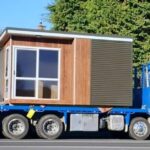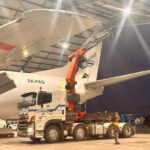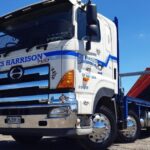Home | About Us | Services | Contact Us
$265m unlocked through Low Emission Transport Fund

Businesses operating in New Zealand have committed around $265 million of investment in low-and zero-emissions transport projects – on road, off-road and on water – through the Low Emission Transport Fund (LETF) over the past decade.
The programme, administered by EECA (Energy Efficiency and Conservation Authority), was revised in 2021, expanding the remit of its predecessor, the Low Emissions Vehicle Contestable Fund (LEVCF), which launched in 2016.
Projects approved for funding in the LETF’s final rounds – 14, 15 and 16 – have now been announced today.
Richard Briggs, EECA’s group manager – delivery and partnerships, said the LETF had unlocked an extraordinary amount of private capital for projects that would not have happened as quickly or at all, as well as lowered organisations’ operating costs by improving energy efficiency and productivity.
“The programmes demonstrated the benefits for business in making the switch to low or zero-emissions vehicles, machines, and vessels, showing others in their sectors what’s possible and viable.”
Briggs said the rapid acceleration of energy-efficient transport technologies had reduced the risk for early adopters and the need for this type of support. As such, the LETF had wound down to a natural end.
Milestone projects include the world’s first electric milk tanker (Fonterra) and electric hydrofoil ferry in commercial operation (Vessev and Fullers 360).
The fund supported New Zealand’s first hydrogen-powered truck (NZ Post) and truck (Auckland Transport), first electric double-decker buses (Tranzit, Metlink, Greater Wellington Regional Council) and first electric supermarket delivery vans (Foodstuffs).
The LETF also co-funded around half of New Zealand’s 1300+ public EV chargers, with almost 700 more in the pipeline. These include the country’s first high-speed DC chargers (ChargeNet).
Briggs said EECA continued to support the heavy vehicle sector to improve its energy efficiency and lower operating costs through the Low Emissions Heavy Vehicle Fund, which offers grants of up to 25% of the purchase price of a new zero-emissions heavy vehicle, or 25% of the cost to convert an existing ICE vehicle to be power by zero or low-emissions technologies.
EECA would ensure successful delivery of previously co-funded projects, as well as provide data on EV charging infrastructure and fuel use across the transport sector, Briggs said.
“EECA is New Zealand’s lead agency and expert voice on energy use and we’re continuing to evolve to ensure we’re best placed to support the market.”
Round 14 of the LETF launched on 29 July 2024 for Vehicles, Technology, Off-road and Marine. The round closed on 9 September 2024. EECA has approved 12 projects that would allocate co-funding of $2,198,620.
Etrucks Limited, $20,000: Etrucks will import and demonstrate an E1400 Windrose long-range electric truck. The E1400 has a loaded range (49t) of 670km. The truck will come equipped with MCS and CCS2 charging.
Port Napier Limited, $302,000: Port of Napier will demonstrate autonomous battery-electric container terminal tractors (ABECTTs) and a battery-swap charger in their port operations.
ContainerCo (NZL) Limited, $232,000: ContainerCo will replace a single empty container handler with a fully electric version to demonstrate that the current diesel empty handlers could be entirely replaced with electric handlers.
Seeka Limited, $27,000: Seeka will demonstrate two custom-designed electric ATVs for use under kiwifruit canopies, reducing emissions, improving safety, and cutting operational costs while aligning with sustainability goals through reduced fuel and maintenance expenses.
Lyttelton Port Company Limited, $252,000: Lyttelton Port Company will demonstrate replacing a diesel empty container handler with a battery electric equivalent.
Green Pacific Shipping Limited, $500,000: Green Pacific Shipping will demonstrate a 30-passenger electric foiling ferry built by Candela to operate between Auckland, Coromandel and Waiheke. Being transportable, including its charging equipment, it will be available around New Zealand for demonstration and trial by other potential users.
Change Fuel Technologies Limited, $97,000: Change Fuel Technologies will build and demonstrate a hydrogen refuelling vehicle which can supply hydrogen to off-road vehicles.
Rotorua Forest Haulage Limited, $20,000: Rotorua Forest Haulage will work with Scania NZ to demonstrate a fully electric truck that can operate on New Zealand roads at HPMV weights of 54T.
Action Manufacturing, $132,000: Action Manufacturing will demonstrate a 100% electric refrigerated semi-trailer. The technology represents a step forward for trailer refrigeration.
D&H Equipment Limited, $242,000: D&H Equipment alongside Ballance Agri-Nutrients will demonstrate a 20-tonne electric wheel loader in their fertiliser plant. This will test the suitability of electric off-road equipment in a highly corrosive fertiliser environment.
Kwetta Limited, $239,600: This project aims to demonstrate how Kwetta’s ‘grid first’ innovation can unlock and optimise existing network infrastructure for EV fast charging, by piloting Kwetta’s dynamic flexibility grid service.
United Civil Limited, $135,020: United Civil Construction will demonstrate their first fully electric 4-tonne excavator in Northland and Napier. This size excavator is widely used across many sectors and the project will demonstrate its use case across two regions.
The post $265m unlocked through Low Emission Transport Fund appeared first on NZ Trucking.




